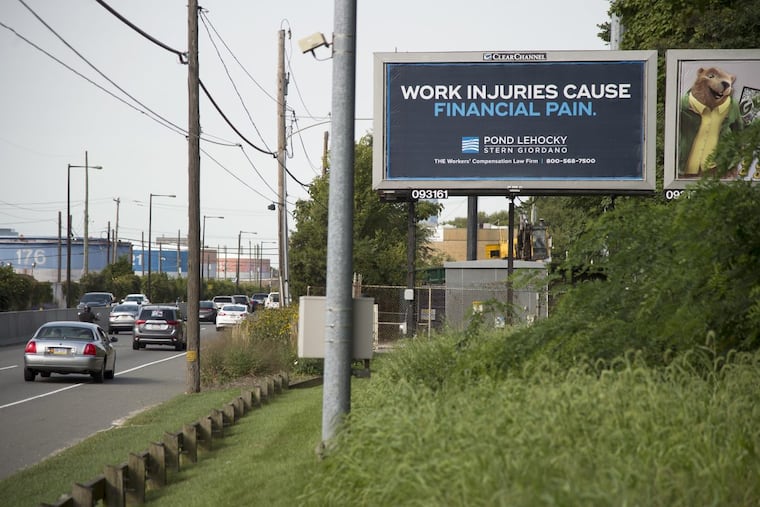Workers' comp firm dumping control of controversial mail-order pharmacy
Big workers' comp law firm Pond Lehocky wants to get out of the mail-order pharmacy business after a newspaper investigation reveals possible conflicts of interest and exorbitant prices for unproven pain creams.

Less than three months ago, the founding law partners at Pond Lehocky Stern Giordano described their mail-order pharmacy as an "obvious" benefit to the injured workers they represent.
"We have no problem with this issue being covered in the media," they wrote in a Sept. 26 op-ed column.
Now, three of those partners are quietly seeking to relinquish their controlling interest in Workers First Pharmacy. Their names are nowhere to be found on a list of proposed new owners recently submitted to state regulators.
Pond Lehocky has declined to discuss the apparent divestiture, which follows an Inquirer and Daily News investigation that found that the workers' compensation law firm had been referring clients to doctors, then asking the doctors in emails to send the patients to Workers First.
Legal and medical ethicists say the lawyer-owned pharmacy could lead to conflicts of interest and drive up medical costs. Workers First has billed insurance carriers upward of $4,000 per tube of compounded pain cream, which are not approved by the Food and Drug Administration.
"That's worrisome. They're sending clients to a place where they're make money off the clients," ethics attorney Samuel Stretton said Monday. "It smells bad. It doesn't help the legal profession at all."
Records show that Pond Lehocky, which describes itself as the largest workers' comp law firm in Pennsylvania, controls 60 percent of Workers First, split among three named partners: Sam Pond, Jerry Lehocky, and David Stern. Bryan Reilly, the law firm's chief financial officer, is a 5 percent owner of the pharmacy and its managing member.
But an application filed this month with the state Board of Pharmacy would transfer 72 percent of the pharmacy to four other owners and replace Reilly as managing member. Neither Reilly nor the three Pond Lehocky partners appear as listed owners under the proposed new ownership structure.
Pond Lehocky partners replaced with new owners
Wanda Murren, a spokeswoman for the Pennsylvania Department of State, said the application is awaiting approval from the Board of Pharmacy. She said the board had received no information about why Workers First was seeking to change owners.
Pond did not respond to requests for comment this week. He has previously defended the pharmacy as an add-on service that enables injured workers to quickly get medication while their workers' comp claims are being disputed by their employers' insurance companies.
"We are proud of the alliance between attorneys and the medical community that works together to protect our clients from a very strong and determined opponent: the insurance industry," Pond wrote in a September statement.
When asked Monday about the change in Workers First ownership, Abraham Reich, the attorney whom Pond Lehocky consulted for an ethics opinion on opening the pharmacy, said only, "It's true." He declined to elaborate.
Reich previously said that the pharmacy did not run afoul of professional conduct rules. He described it as similar to a contingency-fee agreement in which a lawyer gets paid if the client does.
Workers First, which operates on Lancaster Avenue in Haverford, told the Board of Pharmacy in its initial August 2016 application that no medical practitioners had a financial interest in the pharmacy.
The Inquirer and Daily News reported that in fact, several doctors were undisclosed part-owners, and that at least one of them had sent patient scripts there.
At the time of the September story, Workers First was managed and partly owned by Insight Medical Partners, a Conshohocken consulting firm that operates area pharmacies.
Three of Insight's founders are among dozens of defendants being sued in Philadelphia Common Pleas Court by Liberty Mutual Insurance and other insurance firms for prescribing $3.7 million in allegedly fraudulent pain creams.
It is unclear from the new ownership application whether Insight would continue to co-own or manage Workers First. Jeff Jubelirer, a spokesman for the Insight founders, declined to comment Tuesday on the pending ownership change.
The application lists the new majority owners of Workers First as Robert M. Scogna Jr., who would serve as managing member; his father, Robert M. Scogna Sr.; Mariana K. Abdallah; and Inna Levinstein. Each would own 18 percent.
The Scognas, who work in the medical-supply business, according to their LinkedIn pages, could not be reached for comment. Workers First on Tuesday directed a reporter to the pharmacy's attorney, Ryan Becker, who declined to comment.
Abdallah could not be reached for comment. Public records show that she shares a Cherry Hill address with Ray Abdallah, a chiropractor.
Levinstein did not respond to a request for comment. A phone number listed under her name led to a voice mail for Gene Levinstein, a pain management doctor who is among the unlisted minority owners of Workers First. They share a Warminster address.
Gene Levinstein has publicly opposed state House legislation to create an evidence-based drug formulary that would likely cut off payments for the exorbitantly priced skin creams sold by Workers First. Pond Lehocky has linked to one of his op-eds on its website. Neither disclosed that Levinstein owned part of the pharmacy.
The state Senate introduced a similar workers' comp bill in October.
Stretton, the attorney who has criticized attorney-owned pharmacies, said he considers Pond Lehocky to be an outstanding firm. But, he said, Workers First was a misstep, fraught with potential legal and ethical pitfalls.
"It's very lucrative to get into these businesses, but where are we going to end up?" Stretton asked. "I don't like the model they created, even if it was well-intentioned."